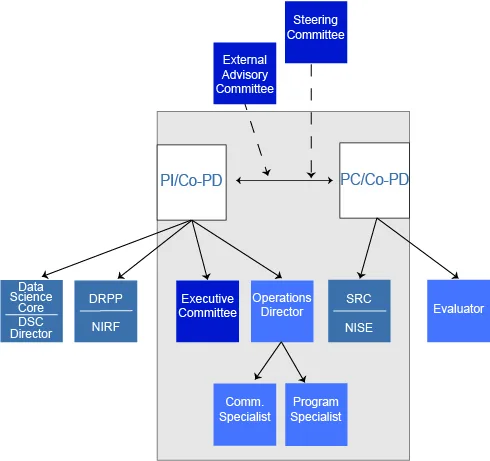NM-INBRE Directory

The NM-INBRE faculty directory encompasses various essential committees and cores that drive the program’s activities and ensure its effectiveness. The Administrative Core serves as the central hub, managing program activities, coordinating research opportunities, and conducting evaluations. The External Advisory Committee oversees DRPP investigator selection and assessment, offering an external perspective on health-focused areas. Additionally, the NM-INBRE Steering Committee, ensures institutional commitment to program goals. The Executive Committee establishes policies and interacts with the External Advisory Committee, overseeing program activities and faculty progress. INBRE-5 introduces Faculty Student Coordinators who aid the NM-INBRE Student Research Committee in overseeing student activities, while science advisors monitor project progress and facilitate professional development for investigators. Regular meetings with investigators further foster research development and best practices in management.
Administrative Core
The NM-INBRE Administrative Core, led by Principle Investigator Dr. Shelley Lusetti, serves as the central hub overseeing program activities, managing budgets and compliance, and conducting evaluations. The Admin. Core coordinates undergraduate research activities, including the Student Research Program (SRP) and other research opportunities. Additionally, the Admin. Core facilitates programmatic interactions, manages fiscal responsibilities, oversees faculty mentoring, and evaluates program effectiveness, among other duties.
External Advisory Committee
The External Advisory Committee, consisting of five members, oversees the selection, monitoring, and assessment of DRPP investigators, reviewing network operations semi-annually and submitting annual reports with improvement recommendations to the Steering Committee. Composed of established scientists with NIH research program experience, the EAC provides an external perspective on the DRPP’s health-focused areas, approving project selections before NIGMS programmatic approval when necessary.
Steering Committee
The NM-INBRE Steering Committee, chaired by PI Lusetti, oversees network institutions’ commitment to supporting program goals, ensuring research capacity building in New Mexico. Comprised of senior institutional leaders from participating institutions, annual meetings with PI Lusetti reinforce institutional dedication to the program’s mission and provide support for faculty and student involvement in NM-INBRE activities.
Institutional Liaisons
The Executive Committee, also known as Institutional Liaisons, establishes and implements policies for the NM-INBRE program, aligning with NIG guidelines, and interacts with the External Advisory Committee. It oversees program activities, reviews DRPP project applications, and monitors the progress of faculty investigators. Institutional leads, appointed by each network partner institution in consultation with PI Lusetti, facilitate communication and represent organizational interests within the EC, ensuring effective representation of participating institutions and communities.
Student Research Committee
INBRE-5 introduces a new institutional leadership group of faculty student coordinators who serve on the NM-INBRE Student Research Committee (SRC), chaired by PC Shutter, overseeing the Student Research Program (SRP) and other student activities across network institutions. Faculty Student Coordinators (FSCs) participate in student and faculty recruitment for NM-INBRE research activities, appointed by institutional liaisons based on their faculty roles and connections within STEM communities.
Science Advisors
Our team of science advisors monitors the progress of investigators and projects within NM-INBRE, with each DRPP investigator assigned an advisor matching their research area. Facilitating professional development leading to academic advancement and successful entry into the NIH grant system are key goals, with science advisors playing a primary role in progress assessment. Additionally, regular meetings are held with investigators to discuss research development and best practices in research management.
